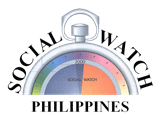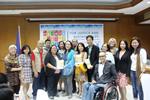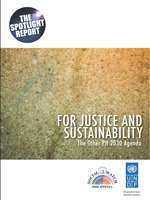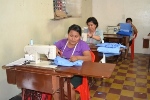Social Watch news
Published on Mon, 2016-07-11 13:22
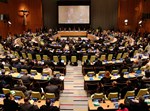
UN Secretary General Ban
Ki-Moon addresses a session of
the HLPF. Photo: UN
|
As the High-Level Political Forum (HLPF) convenes this week to review implementation of the Sustainable Development Goals (SDGs), CESR’s Kate Donald and Lena Kahler examine whether the new agenda will live up to its promise of promoting accountability and “leaving no one behind”.
As the global follow up and review mechanism for the 2030 Agenda for Sustainable Development adopted at the UN nine months ago, the HLPF is where world leaders will take stock of countries’ SDG performance and address challenges in implementation. Yet serious doubts remain as to whether it will deliver on its mandate to “provide political leadership, guidance and recommendations on the Agenda's implementation and follow-up” as well as ensure accountability for the goals.
|
Published on Sat, 2016-07-09 08:22
While more than 26.3 percent or about 27 million Filipinos live in poverty, the benefits from growth are concentrated in the hands of few billionaire families, the less than 1 percent who dominate the political economy. Tax injustice is imbedded in the system and unregulated corporate activities harm people and the environment. The Philippines can reduce inequality by changing the economic geography. We can reverse the big city-oriented development by supporting the provincial and local economies. We can do this by shifting from conventional, fossil fuel-intensive farming to organic and sustainable agriculture and by changing the pattern of public expenditure so that adequate resources, and authority, too, are deliberately transferred from the rich regions to the poorer ones.
|
Published on Sat, 2016-07-09 05:48
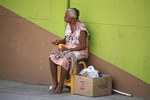
Photo: Alex E. Proimos (CC/Flickr)
|
Peru has experienced sustained economic growth, due largely to rising prices of gold, copper and other minerals, but virtually the entire territory has been given in concession to mining, oil, and logging companies, frequently in conflict with local populations. Income poverty has decreased, but multidimensional poverty has worsened. Progress has been made in circulation of money and electronic and telephone connectivity, but there has been a decline in quality of life and public safety, as increased levels of crime is taking over streets and cities and corruption resulting from the influence of corporate power reaches every part of the government.
|
Published on Fri, 2016-07-08 22:48
Cyprus is situated in the intersection of Africa, the Middle East and Europa. However, instead of the more nuanced and fluid identity required for the country to be a truly multicultural society, public and private discourses are polarized, traditionally between Turkey and Greece and, since the banking crisis of 2015, between those defending public welfare spending and the power of labor unions and the advocates of free market neoliberalism and limited government. The 2030 Agenda risks confronting a long established inertia on the part of the Government with regard to non-binding agreements and will likely be opposed by the corporate sector, as it will be assumed that the ethical standards, like due diligence and minimization of carbon footprint, will increase their operational cost or lower the demand.
|
Published on Fri, 2016-07-08 19:02
Social Watch, with different partners will be co-hosting several side-events during the High-level Political Forum on Sustainable Development (HLPF) to be held in New York, July 11th to 20th, 2016. See below the information of the side events.
|
Published on Fri, 2016-07-08 18:15
Signing up to the promise of a Philippines where no one is left behind and following the path to sustainability, Social Watch Philippines (SWP), along with the CSO contributors from its network, presents on Friday our "Spotlight Report" on the 2030 Development Agenda in a dialogue with the National and Economic Development Authority (NEDA) at SEAMEO-Innotech, Quezon City.
This is in time for the presentation of the Philippine report to the first High Level Political Forum (HLPF) on July 11-20 at the UN Headquarters in New York. In consort with 22 other countries, the Philippines is expected to lead the national review and report on how the 2030 agenda will be translated into national sustainability plans.
|
Published on Fri, 2016-07-08 18:06
The Philippine economic growth is unjust and not sustainable, as the nation's wealth is concentrated among few billionaires and highly dependent on fossil fuels, according to Social Watch Philippines.
"A just and sustainable growth ensures that no one is left behind," Isagani Serrano, SWP co-convenor and Philippine Rural Reconstruction Movement president, said on Friday.
The civil society group noted the Philippines can achieve its sustainable development goals by 2030 if the economic growth is not concentrated in the hands of a few billionaires.
|
Published on Fri, 2016-07-01 00:00
“For Justice and Sustainability: The other PH 2030 Agenda”
Social Watch Philippines, 2016
Introduction
The Philippines will be free of poverty and will be well on the way to sustainability by 2030. No one will be left behind. That’s the promise, that’s what our government signed up to in 2015.
This report, our report, entitled “FOR JUSTICE AND SUSTAINABILITY: The Other PH 2030 Agenda”, is about taking on our government on that promise. It is an attempt by Social Watch Philippines (SWP) to present its view of the stubborn Philippine development dilemma and how it may be overcome. Through this report we offer our support and cooperation in figuring out the sustainability problem and finding lasting solutions to the cyclical problems of high poverty, high inequality and continuing environmental degradation despite or because of economic growth.
|
Published on Thu, 2016-06-30 23:15
More than 9 million Afghans (over one third of the population) are not able to meet their basic needs and many more people are highly vulnerable to becoming poor because of the ongoing conflict and heavy reliance on agriculture and international aid as well as the lack of clear pro-poor policies. Women’s participation in the national Parliament (27%) is well above the global average of 21.8 percent, but gender norms in the culture and long walking distances to school in rural areas still prevent many girls to access education and violence against women remains a daunting challenge.
The Afghan civil society report acknowledges that the country “has received an unprecedented amount of international development aid over the past 14 years”. This huge aid inflow “has benefited the country, buy it has also brought problems: corruption, fragmented and parallel delivery systems, poor aid effectiveness and weakened governance.”
|
Published on Thu, 2016-06-30 23:11
Tax evasion and environmental vulnerability have been identified by Salvadorean civil society as the major obstacles to achieving the SDGs in El Salvador. Tax evasion in 2013 was estimated at $1.5 billion, more than one fourth of total government revenue. At the same time, the annual average of losses due to extreme weather events in the XXI century so far is "equivalent to almost 60 percent of the annual average of its public investment". It is urgent to take a development path that protects Nature from further degradation and strengthens ecosystems to reduce environmental vulnerabilities that mostly affect the poorest sectors of the population.
|
SUSCRIBE TO OUR NEWSLETTER
Submit

|


